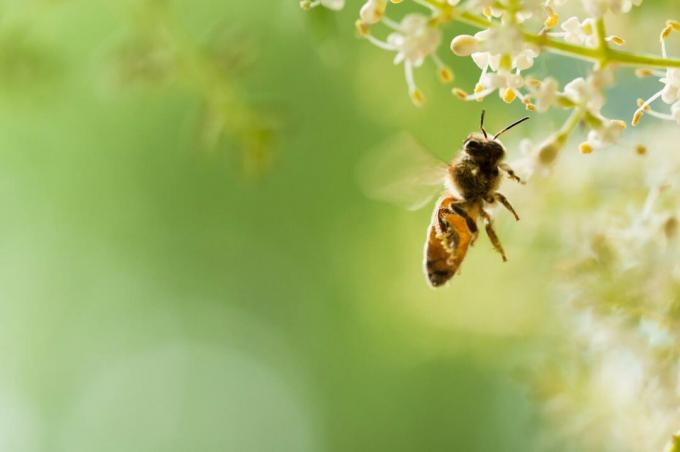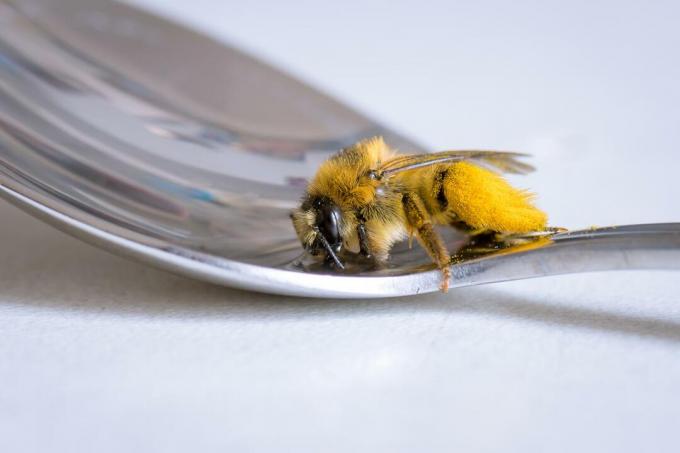The death of bees is on everyone's lips. You can find out how you can help bees even as a layman in our article.

bees (anthophila) are irreplaceable in our gardens: almost 80% of all wild and crop plants depend on pollination dependent on insects, almost two thirds of the pollination performance goes to wild bees and honey bees back. In this way, bees not only ensure that plants can reproduce, but also make a significant contribution to the preservation of biodiversity. Vegetable beds and fruit trees also benefit from the small pollinating insects, because larger and higher-quality fruits develop from pollinated flowers. It is all the more frightening that the number of bees has been falling continuously for years: a scarce habitat, monocultures and pesticides make life difficult for the hard-working helpers. Fortunately, more and more people want to help the bees by setting up bee waterers, creating food sources or supporting weak bees.
Help bees: Set up bee waterers
Especially in hot summers, not only we humans thirst for a sip of water - also many bees are thirsty, because in the oppressive heat the flower nectar and morning dew are no longer enough to supply water the end. Unfortunately, other natural water sources such as pond riparian areas and small puddles are present in many gardens become rare - especially in urban areas, bees often do not find enough drinking options. A bee waterer can help here: A flat bowl is filled with water. Since bees cannot swim, particular attention must be paid to a gently sloping access where the animals can easily land. In addition, the bee watering place is equipped with further possible landing areas. In addition to stones and pieces of wood, moss or cork are also suitable for this. The bee waterer can be set up in a warm, sunny place that is as windless as possible and takes up little space, so it is also suitable for attracting bees on the balcony help. However, the water should be regularly checked for dead animals and replaced to prevent the transfer of toxins or pathogens.

feed bees
Wanting to help the bees, many gardeners set up small bowls of honey as an additional food source. However, what is intended as a benevolent gesture can quickly become a danger for bees: pathogens are often transmitted via the honey, which can weaken an entire colony. In about a quarter of all imported honeys from the supermarket, the pathogen of American foulbrood could be detected, which can cause an entire colony to die. You should therefore avoid feeding bees with honey as much as possible. And when disposing of honey jars, care should always be taken to ensure that the lid is closed.
Also, feeding bees sugar water is not recommended by most experts. Although some beekeepers also use this method to replace the honey that has been removed - so sugar water is not harmful to bees - laypeople are advised not to use the method. On the one hand, feeding them sugar water carries the risk of diseases being transmitted or the animals even drowning in the sugary solution. On the other hand, planting bee friendly flowers is a much better alternative if you want to help bees, since not only the sugary nectar can be found here, but also the protein-rich pollen.
Tip to help weak bees: Especially in summer it can happen that you find a single bee that seems too exhausted to fly. Of course, many want to help the weak bee. However, this turns out to be not as easy as it sounds at first: Because bees being social insects, the best way to save them is by taking them back to their people brings. In most cases, however, this is not possible, since the location of the hive is often not known, especially in the case of wild bees. Alternatively, you can try to help the weak bee with sugar water - but this method is only successful if it is really just exhaustion. Sick bees that have been expelled from their hive cannot be saved even with the sugar water solution. In addition, one has to consider that a worker bee lives an average of only 35 days, so that the animals found are often simply due to old age. However, you should never feed exhausted bees honey: the risk of disease transmission is too great.

Help bees with a bee pasture
The easiest and at the same time most effective way to help bees is to plant bee friendly plants. The following applies: the more, the better - the more diverse the range of different plants, the more the bees benefit from it. Wild bees in particular can be supported with plant diversity, because many of them are highly specialized and can only use very specific plants. In addition, care should be taken to use plants with different flowering times to allow for a rich supply of food. Here is from bee friendly herbs up to bee friendly trees something suitable for every garden. Even if you don't have your own garden, you can join us bee-friendly balcony plants create a food supply. Above all, bee-friendly seed mixtures such as these have proven their worth Plantura bee pasture. With this, even garden beginners can create a rich supply of food for bees throughout the year thanks to the various plants it contains.
If you want to help bees, you should also rely on a garden that is as natural as possible and that does not use chemicals. In our Plantura shop you will find a selection of different products from fertilizer to soil, which impress with their natural effectiveness and are absolutely harmless for bees.
You can find out which plants you should not plant if you want to make your garden bee-friendly in our article “Which plants do bees not like?“.
